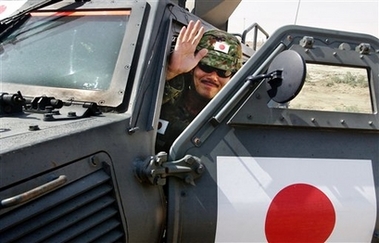Japan ordered the withdrawal of its ground troops from Iraq on Tuesday,
declaring the humanitarian mission a success and ending a groundbreaking
dispatch that tested the limits of its pacifist postwar constitution.

A member of the Japanese Ground Self-Defense
Forces waves as he gets into his vehicle in Samawah, Iraq Tuesday, June
20, 2006. Japan ordered the withdrawal of its ground troops from Iraq on
Tuesday, declaring the humanitarian mission a success and ending a
groundbreaking dispatch that tested the limits of its pacifist postwar
constitution. [AP] |
Prime Minister Junichiro
Koizumi said the 600 non-combat troops -- deployed in early 2004 -- had helped
rebuild infrastructure in the area where they were based, and he pledged further
aid to Iraqi reconstruction.
"Today we have decided to withdraw Ground Self-Defense Forces from the
Samawah region in Iraq," Koizumi said in a nationally televised news conference.
"The humanitarian dispatch ... has achieved its mission."
The withdrawal was decided in consultation with the United States and other
allies, Koizumi said. Defense chief Fukushiro Nukaga told reporters earlier in
the day that the pullout would take "several dozen days."
Koizumi has been a vocal supporter of U.S. policy in Iraq, arguing that the
deployment was needed to aid reconstruction, secure oil supplies and bolster
ties with Washington. He travels to Washington for a summit with President Bush
later this month.
Japan, which hosts 50,000 U.S. troops under a security treaty, will continue
to stand with Washington, said Koizumi, who steps down in September.
"Japan's policy to cooperate with the United States based on the importance
of the Japan-US alliance has never changed and will not change," he said.
The operation constituted Japan's largest and most dangerous overseas
military mission since the end of World War II. While concerns for the troops'
safety were high, the region they were based in was relatively peaceful. As
security deteriorated, they were largely confined to their base.
Tokyo will now consider expanding air operations in Iraq to include transport
of medical supplies and U.N. personnel, following a request from U.N.
General-Secretary
Kofi Annan, said Takenori Kanzaki, head of the ruling party's coalition
partner, the New Komei Party.
"Even after the withdrawal from Iraq, we must continue the efforts to support
Iraq," Kanzaki told reporters.
The troops' top tasks were purifying water and repairing schools, but he
soldiers also patched roads and strengthened medical services. Koizumi said
their work created jobs for the local economy.
Although the mission is strictly non-combat and humanitarian, the deployment
broke new ground as a symbol of Tokyo's more assertive military policy.